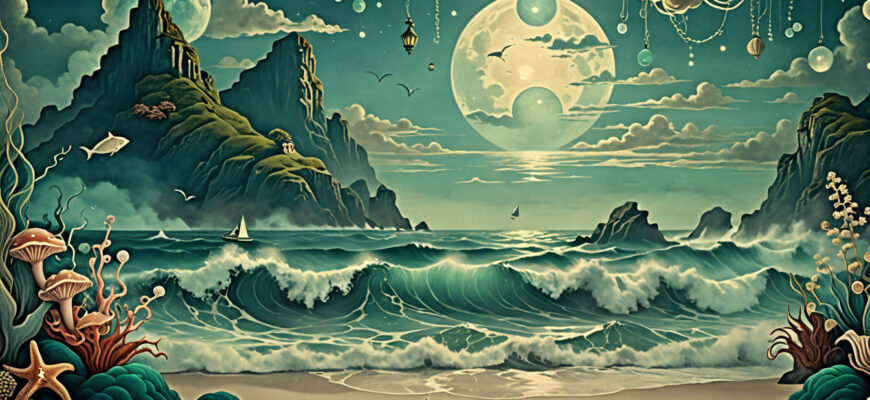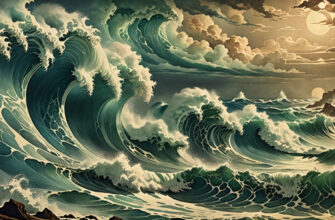Ever wake up after a sea dream and feel like something huge just happened—even if you can’t explain why? There’s this weird emotional buzz that clings to you. Sometimes it’s calm, like you’ve touched something peaceful. Sometimes, it’s like you’ve just survived a hurricane inside your head. Water dreams, especially those with the sea, don’t mess around. They go deep. Think of them less like random stories and more like sudden messages from parts of yourself you don’t usually chat with.
The ocean shows up in dreams as the ultimate symbol of what’s going on under the surface—emotionally, mentally, spiritually. Sure, it’s vast and mysterious, but it also changes based on what’s going on in your life. Sometimes it mirrors burnout, sometimes it’s about hidden fear, and other times it acts like a test of how well you’re navigating your own chaos.
These aren’t always obvious “aha” moments either. A calm ocean might soothe one dreamer but feel hopeless to another. Drowning might actually be the dream’s way of helping you release something.
Whether you’re floating freely or staring into a swirl of underwater shadows, these dreams aren’t accidents. They’re emotional landscapes wearing water masks. Your body remembers them even before your head figures out what it means. Let’s break it down.
- Immediate Emotional Impact
- Dreaming Of The Ocean As Emotional Weather
- Common Sea Dream Scenarios And Their Symbolic Layers
- Drowning, Floating, Or Sailing: What Your Body Is Doing In The Dream Matters
- Looking Into Deep Water: The Fear Of Seeing (Or Not Seeing) What’s Below
- Sea Monsters and Strange Beings
- Lost Things & Sunken Chests
- Sea as Subconscious Map
- When Your Soul Is Crying In Saltwater
Immediate Emotional Impact
Before anything else, try to clock how you felt right inside the dream. Not once you woke up—but in the thick of it. Were you drifting peacefully? Caught in fear? Struggling to swim? That first snap of emotion can usually cut through dream confusion. Your body always knows if it felt free or trapped, soothed or terrified.
There’s brain science behind this too. Our minds link water with survival, safety, and danger all at once. The amygdala—the brain’s fear and emotion center—lights up during dreams involving water, especially the sea. Why? Because deep water is where memory, emotion, and instinct meet. It taps into primal stuff stored deep—stuff we often don’t access while awake.
Dreaming Of The Ocean As Emotional Weather
A glassy blue sea might feel like inner peace, but not always. It can also reflect stillness that’s masking sadness, or numbness mistaken for calm. Watch for the context. Are you alone? Are you waiting for something to happen?
On the flip side, raging waves or dark, stormy surf often signals your inner world throwing a fit—grief, fear, or anger finally breaking the surface. It can also mean a transformation is brewing, and your system is scrambling to keep up.
Common Sea Dream Scenarios And Their Symbolic Layers
Drowning, Floating, Or Sailing: What Your Body Is Doing In The Dream Matters
That panicked flailing underwater? It usually reflects real-life emotional overwhelm. You might be facing something huge and feel like you’re being pulled under with no control. These dreams don’t show up unless something inside you is screaming to be heard.
Then there’s the dream where you just float. Not drowning. Not swimming. Just… there. This can be deep trust, but also emotional passivity. Context is key:
- Are you surrounded by chaos but calm? Then you’re embracing surrender, maybe even healing.
- Is it eerily quiet with nothing around? That could mean you’ve shut off emotionally—on autopilot or resisting engagement.
Now if you’re sailing—holding the rudder, raising the sails—that says something louder: you’re actively managing emotion and identity, even if you’re still in turbulent seas. It’s the inner version of “I got this… somehow.” Even amidst storms, steering is the symbol of evolution.
Looking Into Deep Water: The Fear Of Seeing (Or Not Seeing) What’s Below
If you’re looking into dark, murky water in a dream, it’s often your subconscious bugging you about something unresolved—some trauma or buried emotion you’ve filed away and hoped would drown. Spoiler: it didn’t.
| Dream Element | Emotional Clue |
|---|---|
| Murky depths | Hidden trauma, fear, unmet truths |
| Clear blue water | Truth-seeking, awakening, mental clarity |
| Refusing to look down | Emotional avoidance, self-protection, denial |
There are times in these dreams when you won’t even glance at what’s below. You might actively avoid looking at the water. That’s not weakness—it’s survival instinct. Your psyche knows when it’s not the time to deal with something heavy, and that’s okay. But if the same dream keeps coming back? That’s probably your cue that it’s time to face whatever’s swimming beneath.
Sea Monsters and Strange Beings
Ever woken up tense, heart racing, and couldn’t forget what was looking at you from the water? Sea monsters in dreams aren’t just creepy set pieces; they’re personal. Symbolically, they’re our shadow selves—those suppressed fears, truths we’re scared to say out loud, desires we think are “too much.” Whether it’s tentacles, rows of teeth, or just something watching beneath the waves, they often signal that something buried is rising… and it wants to be felt.
Not every sea being is frightening. Dolphins, whales, or sea turtles gliding by in your dream might be showing up as guardians or ancestral whispers reminding you that you’re protected. Their calm presence can signal wisdom, soul memory, or a gentle reminder not to panic while you navigate your deepest waters.
Then there are the things that sting or squirm—jellyfish drifting toward you, electric eels wrapping around your limbs, murky fins circling your legs. These aren’t random. They echo emotional injuries that still hurt when prodded. Think of them as trauma replays your body hasn’t fully filed away yet. Your dream is showing you where it still hurts, not to punish—but to invite healing.
Lost Things & Sunken Chests
Treasure chests at the bottom of the sea, glowing or rotting, might not be gold in the literal sense. They often represent gifts you’ve forgotten you had—creativity, intuition, resilience—or pieces of your spirit from past lives or old versions of you. If you dream of discovering one, maybe it’s time to dig deeper, reclaim parts of yourself, or finally turn a side project into something real.
And shipwrecks? Entire broken vessels, scattered relics, underwater ruins… That’s not just scenery. It can echo the remnants of your hopes that didn’t make it ashore, or reflect the heavy cost you’ve paid to survive something hard. Think of sunken ships as symbols of your emotional resilience—and sometimes, what it cost you to become that strong. They’re memory markers, too, of who you once were before the storm hit.
Sea as Subconscious Map
When people dream of the sea, it’s usually not about tourism. It’s about messages. The sea flows like your emotion—shifting, crashing, calming, swallowing. Water in dreams is your emotional temperature check. Clear or muddy, stormy or still, it’s reflecting what’s going on inside. Psychologically, oceans in dreams are keys to your subconscious relationship with change, depth, and the “messy middle” of healing.
Jungian dream analysts see the ocean as a core archetype: collective unconscious, feminine power, mystery. Therapists working with dreams might ask: How did the water make you feel? Were you swimming with ease or drowning in fear? Even the color of the sea matters—it carries an emotional signature your psyche is trying to communicate.
When Your Soul Is Crying In Saltwater
If your soul’s trying to send an SOS, the sea is often where it shows up. These aren’t just dreams—they’re wake-up calls. A soul crying out in saltwater dreams usually means it’s time to shed something heavy: a toxic relationship, a lifelong pattern, a role that no longer fits. These waters can mourn you while also baptizing the part of you that’s ready to grow. The tears blend with the sea—because grief and rebirth often do.








